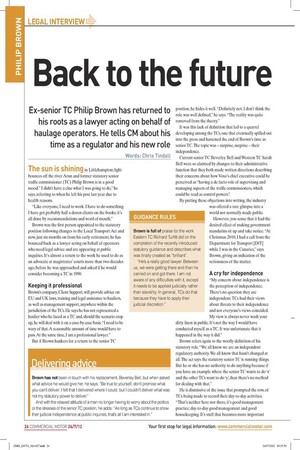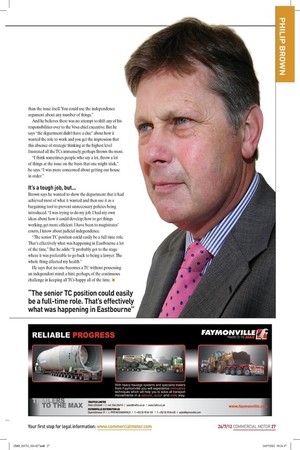Back to the future
Page 17

Page 18

If you've noticed an error in this article please click here to report it so we can fix it.
Ex-senior TC Philip Brown has returned to his roots as a lawyer acting on behalf of haulage operators. He tells CM about his time as a regulator and his new role
Words: Chris Tindall
The sun is shining in Littlehampton; light
bounces off the river Arun and former statutory senior trafic commissioner (TC) Philip Brown is in a good mood.” I didn’t have a clue what I was going to do,” he says, referring to when he left his post last year due to health reasons.
“Like everyone, I need to work. I have to do something. I have got probably half a dozen clients on the books; it’s all done by recommendations and word of mouth.” Brown was the irst person appointed to the statutory position following changes to the Local Transport Act and now, just six months on from his early retirement, he has bounced back as a lawyer acting on behalf of operators who need legal advice and are appearing at public inquiries. It’s almost a return to the work he used to do as an advocate at magistrates’ courts more than two decades ago, before he was approached and asked if he would consider becoming a TC in 1990.
Keeping it professional
Brown’s company, Client Support, will provide advice on EU and UK laws, training and legal assistance to hauliers, as well as management support, anywhere within the jurisdiction of the TCs. He says he has not represented a haulier who he faced as a TC and, should the scenario crop up, he will deal with it on a case-by-case basis. “I need to be wary of that. A reasonable amount of time would have to pass. At the same time, I am a professional lawyer.” But if Brown hankers for a return to the senior TC position, he hides it well. “Deinitely not. I don’t think the role was well deined,” he says. “The reality was quite removed from the theory.” It was this lack of deinition that led to a quarrel developing among the TCs, one that eventually spilled out into the press and hastened the end of Brown’s time as senior TC. The topic was – surprise, surprise – their independence.
Current senior TC Beverley Bell and Western TC Sarah Bell were so alarmed by changes to their administrative function that they both made written directions describing their concerns about how Vosa’s chief executive could be perceived as “having a de facto role of supervising and managing aspects of the trafic commissioners, which could be read as control powers”.
By putting these objections into writing, the industry was offered a rare glimpse into a world not normally made public.
However, you sense that it had the desired effect of making government mandarins sit up and take notice. “At Christmas 2010, I had a call from the Department for Transport [DfT] while I was in the Canaries,” says Brown, giving an indication of the seriousness of the matter.
A cry for independence
“My concern about independence is the perception of independence. There’s no question they are independent. TCs had their views about threats to their independence and not everyone’s views coincided. My view is always never wash your dirty linen in public. It’s not the way I would have conducted myself as a TC. It was unfortunate that it happened in the way it did.” Brown refers again to the woolly deinition of his statutory role. “We all know we are an independent regulatory authority. We all know that hasn’t changed at all. The act says the statutory senior TC is running things. But he or she has no authority to do anything because if you have an example where the senior TC wants to do ‘x’ and the other TCs want to do ‘y’, then there’s no method for dealing with that.” He is dismissive of the issue that prompted the row, of TCs being made to record their day-to-day activities. “That’s neither here nor there, it’s good management practice; day-to-day good management and good housekeeping. It’s stuff that becomes more important than the issue itself. You could use the independence argument about any number of things.” And he believes there was no attempt to shift any of his responsibilities over to the Vosa chief executive. But he says “the department didn’t have a clue” about how it wanted the role to work and you get the impression that this absence of strategic thinking at the highest level frustrated all the TCs immensely; perhaps Brown the most.
“I think sometimes people who say a lot, throw a lot of things at the issue on the basis that one might stick,” he says. “I was more concerned about getting our house in order.”
It’s a tough job, but...
Brown says he wanted to show the department that it had achieved most of what it wanted and then use it as a bargaining tool to prevent unnecessary policies being introduced. “I was trying to do my job. I had my own ideas about how it could develop; how to get things working, get more eficient. I have been to magistrates’ courts, I know about judicial independence.
“The senior TC position could easily be a full-time role. That’s effectively what was happening in Eastbourne a lot of the time.” But he adds: “It probably got to the stage where it was preferable to go back to being a lawyer. The whole thing affected my health.” He says that no one becomes a TC without possessing an independent mind; a hint, perhaps, of the continuous challenge in keeping all TCs happy all of the time. ■
GUIDANCE RULES
Brown is full of praise for the work Eastern TC Richard Turfitt did on the completion of the recently introduced statutory guidance and describes what was finally created as “brilliant”.
“He’s a really good lawyer. Between us, we were getting there and then he carried on and got there. I am not aware of any difficulties with it, except it needs to be applied judicially rather than slavishly. In general, TCs do that because they have to apply their judicial discretion.”
Delivering advice
Brown has not been in touch with his replacement, Beverley Bell, but when asked what advice he would give her, he says: “Be true to yourself; don’t promise what you can’t deliver. I felt that I delivered where I could, but I couldn’t deliver what was not my statutory power to deliver.” And with the relaxed attitude of a man no longer having to worry about the politics or the stresses of the senior TC position, he adds: “As long as TCs continue to show their judicial independence at public inquiries, that’s all I am interested in.”









































